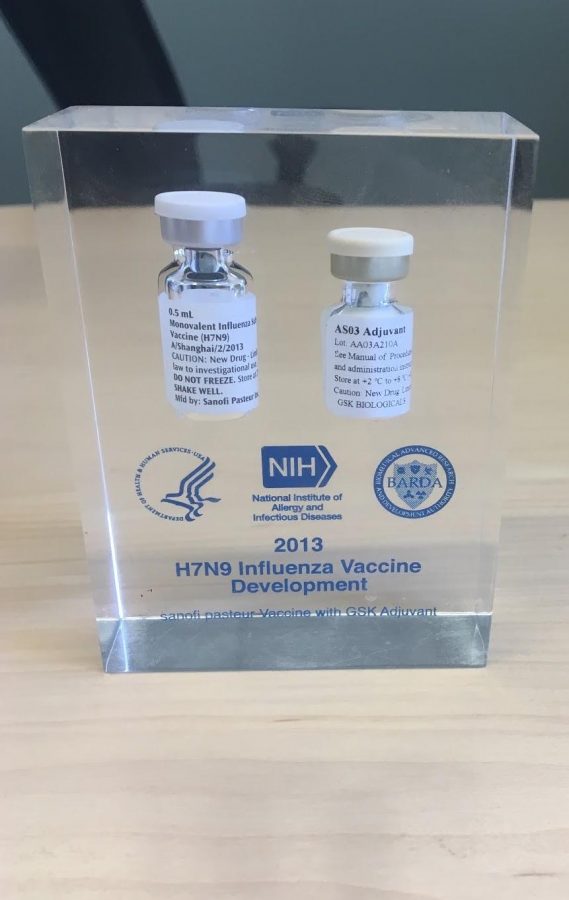Vanderbilt students’ encounter with the flu often comes in the form of the dreaded yet relatively harmless “Commons Plague.” For Dr. Buddy Creech (BS ’95, MPH ‘06), a pediatric infectious diseases physician at Vanderbilt University Medical Center, influenza is a much more serious issue. Every year, he treats critically ill children whose lives are threatened by the flu. These deaths have created a strong desire in Creech to develop a more effective flu vaccine through his work in the Universal Influenza Vaccine Initiative. This project, directed by Dr. James Crowe, also a pediatric infectious diseases physician at VUMC, seeks to develop a vaccine that will protect against all strains of flu.
“The goal is to make a vaccine that would protect against all forms of flu, both seasonal influenza as well as new strains (like bird flu) that are often emerging from Asia,” Creech said. “That’s the universal flu project.”
The limited success of the current flu vaccine is a result of its guessing-game nature. Each year, 2 or 3 strains of influenza virus circulate throughout the northern and southern hemispheres. A team of influenza experts convene twice each year to predict which strains will circulate when and where, utilizing their predictions to build a flu vaccine. However, the ability of each strain to mutate sometimes renders the flu vaccine ineffective.
At the core of vaccine creation lies hemagglutinin, a protein on influenza viruses that allows flu to penetrate cells. The structure of this protein resembles a lollipop; the cap, or head, resembles the candy portion, while the stem, or stalk, of the protein resembles the lollipop stick. Current vaccines target only the head, which is particularly susceptible to mutations that at times render vaccines ineffective. The Universal Influenza Vaccine Initiative, on the other hand, seeks to target additional flu proteins, such as the stalk, a much more stable region. Although this area is also capable of mutating, it possesses a certain degree of stability in order maintain its ability to anchor inside the cell.

The ability to pursue this initiative, which is a part of the larger Human Vaccines Project, lies in the expertise of Dr. Crowe’s laboratory, which is one of the world’s best at extracting B-cells, a white blood cell, from human blood and then pinpointing the antibodies the B-cells produce. The precise technology from Crowe’s lab has enabled accomplishments such as identifying potentially life-saving antibodies for a number of respiratory viruses, Ebola virus and other emerging infectious diseases.
“Dr. Crowe and his team are experts in figuring out which antibodies are important, making them in bulk, determining their biology, and then evaluating their effectiveness in animal models of infection,” Creech said. “Their laboratory has been thinking about influenza for a long time and has all the tools in place to tackle this problematic pathogen.”
The first step in the Universal Flu Vaccine Initiative is conducting detailed observations of the immune responses of flu vaccine recipients about a week after their initial vaccination. Next, the project seeks to evaluate vaccine responses in real time by measuring blood levels of antibodies more frequently (on the order of hours, rather than days) to determine how quickly individuals can begin to mount an effective response.
The project ultimately seeks to become a global initiative taking the impact of age, gender, and exposure into account. Creech highlights the influence of the latter factor, emphasizing the lifelong implications of early exposure.
It’s rewarding to know that you’re contributing to something bigger than yourself
“We think the very first flu that someone sees, either by vaccine or by infection, sets them on a course for the rest of their lives, potentially constraining the immune system to respond best to the strain they were first infected with,” Creech said. “It’s such a striking response that one can predict, for example, if someone was born before 1957 based on their response to influenza.”
The project has critical social implications. Although its successful completion will take many years, one of its goals is to develop a vaccine that could be delivered perhaps once every five or ten years instead of annually, as it is now. Thus, the opportunity would open up to developing countries that cannot afford an annual vaccine to purchase one that is administered much less frequently.
“We want to be a part of creating a highly effective, worldwide vaccine, that could really stop flu in its tracks,” Creech said.
While this global vaccine will not be ready for some time, the research behind it is currently in the works. The National Institutes of Health has prioritized the development of a universal influenza vaccine and is providing significant resources to investigators around the country to tackle this problem.
“Projects like this are why many of us do research,” Creech said. “It’s exhilarating to be one of the first people to know something. Whether you’re looking at a gel, or seeing a file of DNA sequences, or seeing the results from a clinical trial, it’s rewarding to know that you’re contributing to something bigger than yourself. And at the end of the day, to know that we might be able to protect the most vulnerable around us with a universal influenza vaccine – that’s a reason to get excited about science.”











